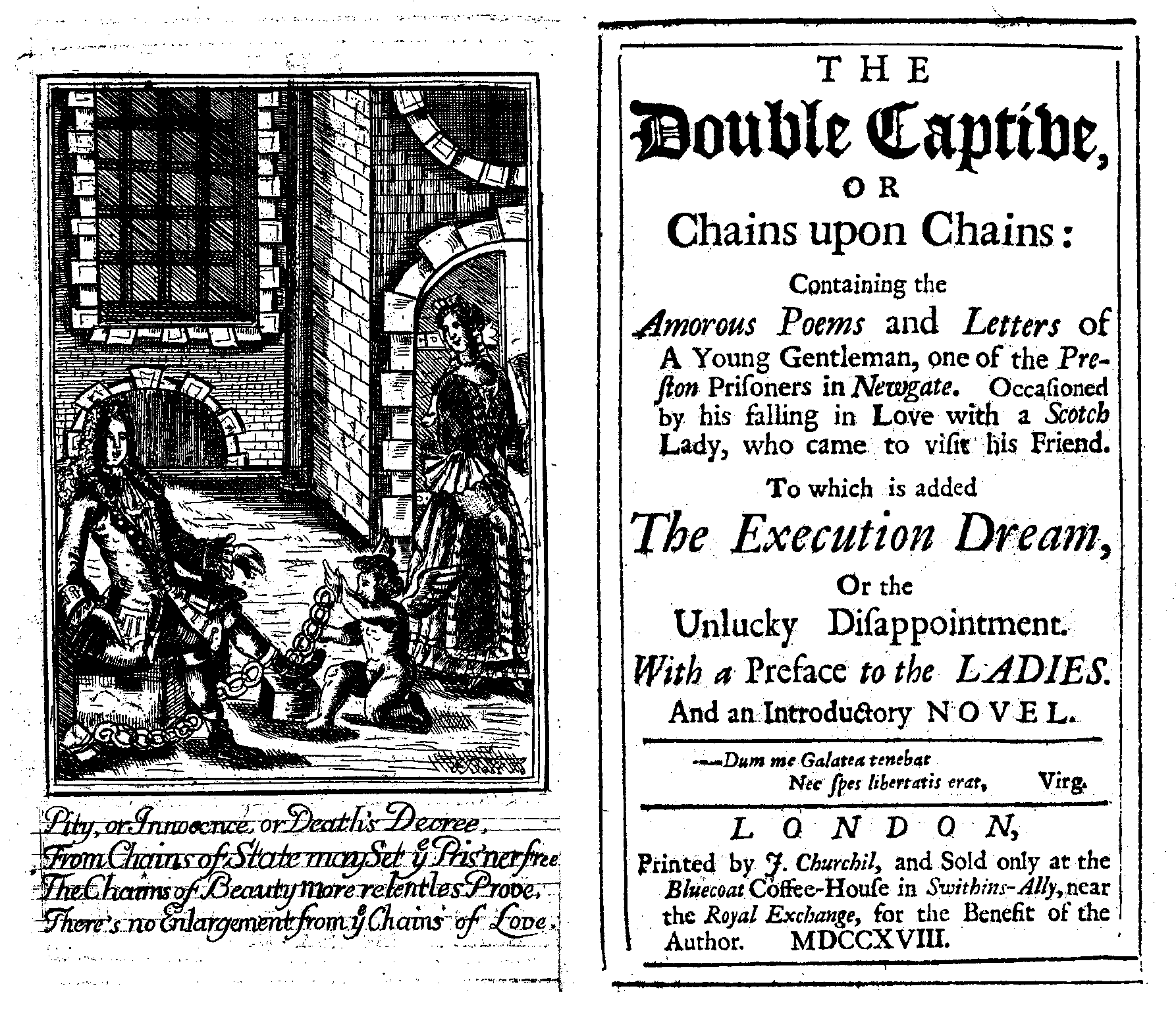![]() The Novel
The Novel
http://pierre-marteau.com/novels.html![]()

THE| Double Captive,| OR| Chains upon Chains:| Containing the| Amorous Poems and Letters of| A Young Gentleman, one of the Pre-|ston Prisoners in Newgate. Occasioned| by his falling in Love with a Scotch| Lady, who came to visit his Friend.| To which is added| The Execution Dream,| Or the| Unlucky Disappointment.| With a Preface to the LADIES.| And an Introductory NOVEL.| [rule]| --- Dum me Galatea tenebat| Nec spes libertatis erat, Virg.| [rule]| LONDON,| Printed by J. Churchill, and Sold only at the| Bluecoat Coffee-House in Swithins-Ally, near| the Royal Exchange, for the Benefit of the| Author. MDCCXVIII.
frontispiece [not very sophisticated: the prisoner with wig and polite outfit in his cell, Amor frees him from his chains, in the door: Lady with fan]/ titlepage/ [8] pp. preface "The Author's Address to the Ladies of Great Britain" u. Contents/ p.[i]-viii "The Double Captive, a novel"/ p.[1]-50 "Miscellany Poems"/ p.51-79 "Letters to the fair Galatea"/ 8°.
{L: 1078.l.31}.
ESTC: t11708.
| a | ||
| b | [...] (London: printed by J. Churchil, and sold by the Booksellers of London and Westminster for the Benefit of the Author, 1718). |
offers a "Novel" with the frame story which gets to a happy ending with the letters of the second part.
During the Jacobite rebellion Preston was shortly occupied by rebell forces, they surrenderd on Nov. 14 1715 to become the "Preston Prisoners in Newgate" distributed over different prisons throughout the country - about 150 of them were imprisoned in London. By casting lots one of 20 were put on trial, four of the London prisoners were finally sentenced to death and executed.
The little book appears as an authentic report of one of the prisoners from London. At times the report rivals Constantin de Renneville's, French Inquisition (London: A. Bell/ T. Varnham/ J. Osborne/ W. Taylor/ J. Baker, 1715).![]() Rare sensations enter the description: the smell of urine in the prison's yard. The mood depends on the weather. A prisoner with whom the the author shares the cell receives a visit from a lady with her daughter. The young lady falls in love with the author. Only some of his poems deal with the imprisonment. The letters addressing the beloved become a diary of the prison period, beginning with the expectation of a possible death sentence and passing through periods of waiting after the plea for clemency is handed in. Regaining a small fortune the author can finally free dare to court his lady.
Rare sensations enter the description: the smell of urine in the prison's yard. The mood depends on the weather. A prisoner with whom the the author shares the cell receives a visit from a lady with her daughter. The young lady falls in love with the author. Only some of his poems deal with the imprisonment. The letters addressing the beloved become a diary of the prison period, beginning with the expectation of a possible death sentence and passing through periods of waiting after the plea for clemency is handed in. Regaining a small fortune the author can finally free dare to court his lady.
o.s.